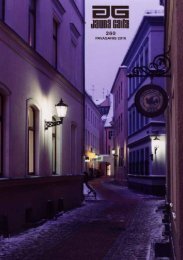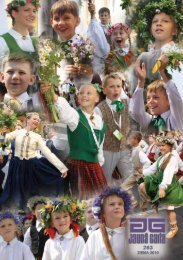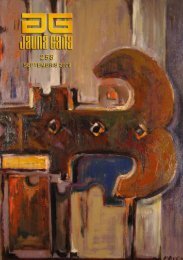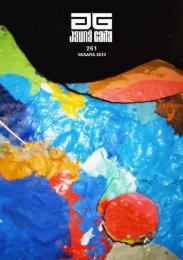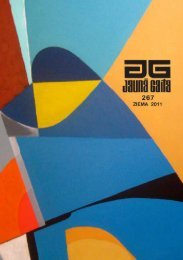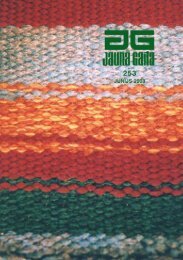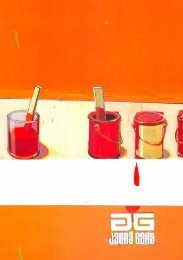Maketa fails - Jura ŽagariÅa mÄjas lapas
Maketa fails - Jura ŽagariÅa mÄjas lapas
Maketa fails - Jura ŽagariÅa mÄjas lapas
Create successful ePaper yourself
Turn your PDF publications into a flip-book with our unique Google optimized e-Paper software.
LETTERS, THE VISUAL ARTS AND MUSIC.<br />
Juris Helds, poet, actor and playwright, uses<br />
dream and reality as warp and weft in the<br />
images he weaves. “To me, poetry is like<br />
hunting for sparks in the dark, without ever<br />
actually seeing the sparks.” Maija Meirāne<br />
introduces him as a noteworthy postmodern<br />
literateur. In this issue he contributes<br />
nine poems and a play Ko darīt? (What<br />
Is to Be Done?), in which a global rhinoceros<br />
flu epidemic, Vladimir Ilyich Lenin risen<br />
from the dead, and a commissioner of<br />
the European Union, all converge on poor<br />
old Latvia to exacerbate its suffering to absurd<br />
levels. ••• Linda Treija reviews an<br />
exhibit of Vija Celmiņa’s paintings in New<br />
York last May, and introduces us to the art<br />
of Sigita Daugule and Laima Bikše in Latvia.<br />
Color reproductions of some of their paintings,<br />
Ilmārs Rumpēters’ dazzling cover, and<br />
photographic art by Gunārs Jana itis, Uldis<br />
Briedis and Uldis Grasis constitute the visual<br />
focus of this issue. ••• Andrejs Streļājevs<br />
is a pianist and organist, graduate of the<br />
Latvian Academy of Music, currently writing<br />
a doctoral dissertation on Latvian organ<br />
music at the University of Toronto. Helēna<br />
Gintere introduces him as a versatile and<br />
ambitious artist who especially enjoys the<br />
art of musically accompanying silent movie<br />
classics.<br />
LITERARY COMMENT. In the current installment<br />
of Eva Eglāja-Kristsone’s magnum<br />
opus on Latvian cultural contacts across the<br />
Iron Curtain during the Cold War, she analyzes<br />
the opinions and attitudes of exile<br />
writers and critics toward Latvian literature<br />
produced under Soviet rule. ••• Almantas<br />
Samalavičius, associate professor of art history<br />
and art theory at Gediminas Technical<br />
University in Vilnius, Lithuania, author of<br />
numerous essays on cultural and literary<br />
criticism, surveys Lithuanian literary production<br />
since the renewal of national independence.<br />
He reports that, despite the distractions<br />
of freedom and the onslaught of<br />
electronic mass media, it has become “almost<br />
normal”. ••• Ansis Kaupēns (1895-<br />
1927) was a highway robber and serial killer<br />
who terrorized the countryside in Zemgale,<br />
Latvia, for six years until he was caught and<br />
hanged. His story has not faded from literary<br />
imaginings. Lāsma Ģibiete reviews three<br />
retellings of this story written within the last<br />
ten years: a musical by Māra Zālīte, a novel<br />
by Ingrīda Karstā and a nonfiction work by<br />
Andris Grūtups.<br />
ACTUALITIES, HISTORY, COMMENTARY.<br />
Aigars Bikše finds that the cause of our ongoing<br />
global economic crisis can be traced<br />
to an uncritical adoption of a pyramidal or<br />
Ponzi scheme for wealth generation by financial<br />
institutions, and insists that artists must<br />
assume responsibility for imagining and articulating<br />
a better model for human progress.<br />
••• One of our Western misconceptions<br />
of Islam is that the Koran forces inhumane<br />
dress codes on women. Uldis Bērziņš,<br />
poet and translator of the Koran into Latvian,<br />
points out that it is not the Koran, but public<br />
opinion, that sets dress codes. This is true<br />
in the Islamic Near East just as it is in the<br />
„secular” West. ••• Rolfs Ekmanis details<br />
the history of the beginnings of Radio Free<br />
Europe and its growth from a shortwave<br />
broadcast capacity of 7.5 kW in 1949 to 250<br />
kW in 1960. Early on, attempts were made<br />
to send information across the Iron Curtain<br />
also via hydrogen-inflated weather balloons.<br />
••• In Kiberkambaris, Latvians in far-flung<br />
corners of the globe engage in an internet<br />
discussion of the pros and cons of trying to<br />
stimulate the Latvian economy by encouraging<br />
the immigration of labor and talent from<br />
other countries. ••• In Marginalia, Vita<br />
Gaiķe, Biruta Sūrmane, Māris Brancis, Jānis<br />
Krēsliņš, Sr., and Rolfs Ekmanis succinctly<br />
and exhaustively cover the most important<br />
cultural and non-cultural events of relevance<br />
to Latvians around the world. Special mention<br />
is made of the Latvian Constitutional<br />
Court’s decision to deny Latvian citizenship<br />
to expatriates who did not apply before<br />
1995, characterizing this as a policy of national<br />
suicide at a time when tens of thousands<br />
of Latvians are emigrating each year<br />
to find employment and to seek citizenship<br />
in more hospitable countries.<br />
BOOK REVIEWS. Ingrida Vīksna’s Es saku<br />
paldies (I Say Thank You), a voluminous<br />
compilation of her poetry on the occasion<br />
of her 90th birthday, and Gundega Repše’s<br />
latest short stories, Stāsti par mācekļiem<br />
(Stories about Disciples) – reviewed by Juris<br />
Silenieks • Nora Ikstena’s collection of observations<br />
and commentaries Šokolādes<br />
Jēzus (Chocolate Jesus) – Biruta Sūrmane •<br />
Gundars Ignats’ debut collection of short<br />
stories Bez jakas (Without a Sweater) –<br />
Astra Roze • Māris Brancis’ bilingual monograph<br />
on the life of artist Edgars Krūmiņš<br />
– Voldemārs Avens • Michael Garleff’s (ed.)<br />
collection on the lives of important Baltic<br />
Germans Deutschbalten, Weimarer Republik<br />
und Drittes Reich – Jānis Krēsliņš, Sr.. jž



